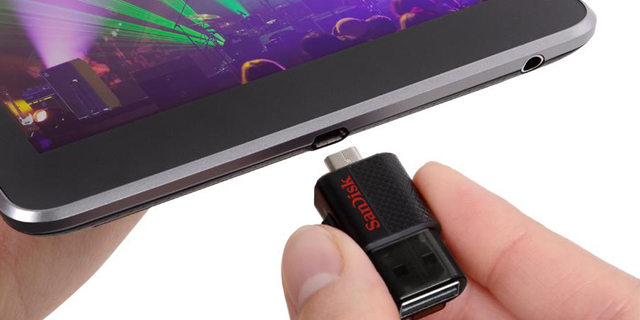
By using software customization you will be able to connect USB memory drives to most of your Android gadgets. For a long time, USB memory drives have been the most popular way to carry around your files, no matter where you wanted to go. However, with cloud storage and the Android gadgets, that has partially changed. This left us with many USB memory drives laying around, just waiting to become useful again. Today’s article will show you how to connect a USB memory drive to your Android gadgets.
Before we proceed
Connecting a USB memory drive to an Android gadget will require, most of the times, a special cable: USB On-The-Go (i.e. OTG cable). You can obviously use a basic OTG cable, or you can opt for more sophisticated ones, such as the powered Y-splitter OTG cables. Just keep in mind that these cables are not meant to charge your gadgets, but to power your USB connected peripherals. Though such a sophisticated cable is not absolutely necessary for a basic USB memory drive, it is however recommended if you are trying to connect an external hard drive or something that requires more than 500mA.
If you have no available USB memory drives dusting around, you can always opt for an OTG capable USB memory drive or a card reader. If they are equipped with micro USB connectors, these units can be directly attached to an Android gadget.
On Kickstarter, there are people who developed the OTG memory drive and created micro SD card readers that can be plugged into your PC or Android gadget. If you are interested in finding out more about this project, do not doubt to visit Kickstarter and have a look.
How to connect a USB memory drive to an Android gadget
This is the easiest part of the process. In order to achieve the best possible results, you will first need to plug your USB memory drive into the OTG cable. Then you will have to plug in the OTG cable into your gadget’s micro USB port.
Connecting a memory drive to an Android gadget is extremely simple if you have the appropriate cable. So far, so easy. But what’s next?
Apps able to read USB memory drives
Once you connect your USB memory drive to the Android gadget, you will have to make use of specific applications if you wish to access the data. Though there are various available options, today we will focus only on two of them.
ES File Explorer
Apart from being an app that makes the most of the micro SD card installed on the device, it is also able to write and read to the connected USB memory drive. And the best part is that no root is required.
First, install the application. Connect your USB memory drive and open ES File Explorer. You will be prompted with a permission screen. Make sure to click the OK button to allow the app access your USB memory drive. Access the side menu, click on the Local section and then select your USB memory drive. If you want to eject, you just close the app and then unplug the USB memory drive. Make sure the indicator light is not flashing before you unplug it.
Nexus Media Importer and Nexus Photo Viewer
These two applications should function with all USB Host-enabled Android gadgets.
Nexus Photo Viewer actually is Nexus Media Importer’s simpler version. Just like in the previous case, you will first have to connect your USB memory drive to an OTG cable, and then simply plug your OTG cable into the Android gadget. Both apps will then ask you if you wish to connect. Make sure to click OK if you wish to proceed. Once in Nexus Photo Viewer or in Nexus Media Importer, you are going to view all the stored content, with several extra features. The photo slide show is available only in the paid version. However, it provides a basic file explorer as well, so there will be no problems if you wish to transfer files from and to your USB memory drive.
If you wish to disconnect, all you will have to do is access the menu button and choose disconnect. The last step is to simply unplug your USB memory drive.
Other File Explorer apps, file manager apps, and file browser apps
There is no doubt that file managers play a vital role in any OS. Below you will find a list of some of the best Android file manager apps.
AntTek Explorer Ex: a free app that features a multi-pane UI and many other graphical elements.
Astro File Manager: this app is still free as long as ads don’t bother you. For $3.99 you can purchase a key that will allow you to get rid of the ads. The app has a few notable upgrades and looks solid and reliable.
Gira.me File Manager: specifically optimized for Android tablets, this app’s themes can be personalized to suit everybody’s tastes. Apart from the standard features, this app also comes with some advanced ones and a built-in image gallery.
File Wrangler: if compared to the other file managers mentioned above, File Wrangler is quite minimal. It comes with all the basic features: file management and browsing, unpacking and creating .zip and .tar files, drop and drag functionality etc. So, if you want something simple, this is the best choice.
So what’s up next?
You should not think that USB memory drives are the only devices that can be successfully connected to your Android gadgets. Powered external hard drives, keyboards, and even mice can be connected. However, it is advisable to keep present the 500mA limit, as some USB peripherals may seriously damage your phones or tablets.
